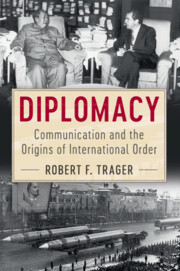Book contents
- Frontmatter
- Dedication
- Contents
- List of Figures
- List of Tables
- Preface
- 1 Can Adversaries Communicate?
- 2 How Perceptions of Intentions Form
- PART I THEORY
- PART II EMPIRICAL ANALYSIS
- 7 The Fruit of 1912 Diplomacy
- 8 How Germany Weighed British Resolve in 1938–1939
- 9 Statistical Analysis of Diplomatic Communication
- 10 Creating International Orders
- APPENDICES
- References
- Index
7 - The Fruit of 1912 Diplomacy
from PART II - EMPIRICAL ANALYSIS
Published online by Cambridge University Press: 25 October 2017
- Frontmatter
- Dedication
- Contents
- List of Figures
- List of Tables
- Preface
- 1 Can Adversaries Communicate?
- 2 How Perceptions of Intentions Form
- PART I THEORY
- PART II EMPIRICAL ANALYSIS
- 7 The Fruit of 1912 Diplomacy
- 8 How Germany Weighed British Resolve in 1938–1939
- 9 Statistical Analysis of Diplomatic Communication
- 10 Creating International Orders
- APPENDICES
- References
- Index
Summary
In precipitating a European war in 1914, the Austrian Emperor followed the advice of all of his most senior counselors save one. The Emperor knew his actions were likely to result in a titanic clash between at least four great powers of Europe. He knew he risked the very existence of his centuries-old empire. And yet, the decision was not directly forced upon him. The German Chancellor had written that “the German Emperor cannot take a position on the current issues between Austria–Hungary and [Serbia], as it is a matter not within his competence” but Germany would “faithfully stand by” Austria. Later, the German emperor advocated an alternative to war, known as the “Halt in Belgrade” proposal; Britain advocated a similar solution. It was Austria that insisted on the course that it knew would bring on the war, and the result was the destruction of the state and the Habsburg dynasty. At the war's end, it was left to an American captain to tell an Austrian Archduke that he would never return to power in Hungary. Captain T. C. Gregory cabled home: “Archie on the carpet 7 P.M. went through the hoop at 7:05.” Why did the Austrians hazard their place in the world? What made them willing to bring on a modern, mechanized war, deaths in the tens of millions, a storm of steel?
The answers to these questions are found, in large part, in what the European powers learned from prewar diplomacy. Diplomacy played the major part in the formation of the actors’ beliefs about each other's intentions and these intersubjective understandings formed the essential elements of the arguments for war. Diplomacy allowed the powers to understand that France would support Russia in a war against the Triple Alliance and eventually convinced Germany that England would join Germany's adversaries. But roots of the conflict can be found further back in European diplomacy. The threats Austria made to Russia during the Crimean War in the middle of the nineteenth century, threats that were never acted upon, engendered the enmity between Russia and Austria, and thereby played a significant role in the creation of the German state as Russia shifted to favor Prussia over Austria. In the late nineteenth and early twentieth centuries, the diplomacy of other powers often left Austria relatively isolated, save for its close relationship with Germany after 1879.
- Type
- Chapter
- Information
- DiplomacyCommunication and the Origins of International Order, pp. 151 - 173Publisher: Cambridge University PressPrint publication year: 2017

